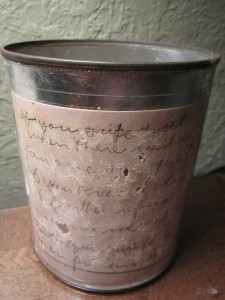Back in the 1980’s, Sandi Patty had a musical hit called “Pour on the Power.” The kids and I often had the cassette version playing in our mini-van as we carpooled and ran errands, and I especially loved this part of the song:
You may think you’re at a wall
But it’s just a door, that’s all
‘Cause you ain’t seen nothin’
Till you pour on the power.
She was singing about the power of Christ, but this weekend we came to a wall of powerlessness of another sort: an electrical outage. Very late Thursday night (i.e. the wee small hours of Friday morning) the house went dark during a wild windstorm when several trees fell across nearby power lines.
As the house gradually cooled off, we headed for our down comforters, confident the power would be turned on as we slept. But when morning came, electricity didn’t, so we scooted our chairs closer to the fireplace and warmed day-old coffee in an old sauce pan, laughing about the inconvenience. When our next door neighbor Bob arrived with an armload of firewood, it was better than Santa Claus.
By evening, however, when the refrigerator’s contents had gotten warm and the hot water cold, none of it was fun anymore. Our youngsters missed their bedtime bath routine, and we worried that 8 week old Emerald, who already had the sniffles, would become cold overnight.
Much of the world has figured out how to live with difficult conditions, but we haven’t, relying on well-powered electrical lines that have made us grow soft in the process. A power outage is cause for complaining, and I even found myself angry at the electric stove/oven because it wasn’t gas-powered.
But as Sandy Patti sang, when we feel we’ve come to a dead-end, we should watch for a surge of God’s power. He’ll always provide that, as well as ideas on how to move forward, despite the dead-end we think we see. He’ll also faithfully match his power-to-endure with our need for it.
As God orchestrates tests for us (some small, some big) he says, “Let’s see if you can apply what you’ve learned about Me and My promises in this situation. Will you believe Me? Will you take advantage of the divine power I’m offering to share with you?”
Our God is practical. He doesn’t expect us to love miserable circumstances, but he does hope we’ll respond to the challenges he sends, even the small ones like power outages, with open minds and cheerful hearts. His desire is that we rely on his power instead of our own to get through everything, no matter what it is.
As for our power outage, I’m not sure if it was the power company or the power of God that turned it back on, but 24 hours after we’d gone dark, someone “poured on the pour” and light (and heat) flooded our home. It was hallelujah’s all around, and however it happened, we were grateful.
“The Kingdom of God is not just a lot of talk; it is living by God’s power.” (1 Corinthians 4:20)






